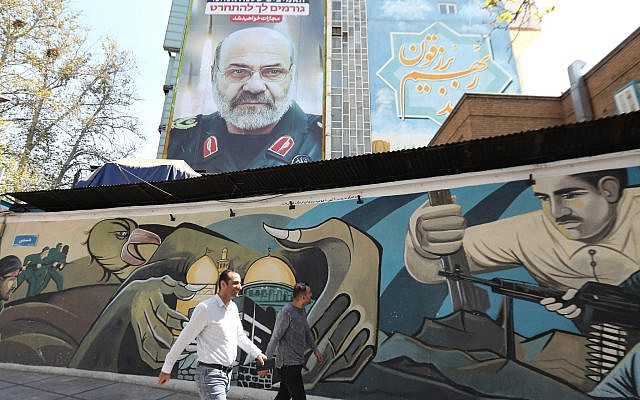The world is holding its breath following Israel’s targeted assassination of senior officers of Iran’s Revolutionary Guard Corps (IRGC) in an airstrike on the Iranian embassy compound in Damascus on April 1. As expected, Ayatollah Ali Khamenei, Iran’s Supreme Leader, has vowed revenge.
Military and intelligence analysts in Israel, the US, and beyond are scrambling to figure out whether Iran will react directly or, as it has done for years, through the same proxies it has been deploying to destabilize the Middle East and escalate tensions with Israel and the US: Hezbollah in Lebanon, the Houthis in Yemen, radical Shiite militias in Iraq, and paramilitary units operating under the umbrella of the Assad regime in Syria.
When seven leading Iranian nuclear scientists were killed between 2007 and 2020, presumably by Israel, and especially when Qasem Soleimani, the former commander of Iran’s Quds Force, the IRGC’s clandestine elite branch, was killed by a US drone strike in January 2020, near Baghdad’s international airport, Tehran opted for muted responses, despite the military capacity to carry out painful reprisals.
So, what will Tehran do now? Continue to let its proxies do its dirty work, a strategy developed and implemented by Soleimani with considerable skill? Or up the ante and strike Israel directly, thereby bringing the region closer to an all-out war, with horrific consequences?
Because decades of hostilities and sanctions have made access to the actual decisionmakers in Tehran nearly impossible, we are left to speculate, usually with very little quality intelligence. So little access, in fact, that we might fail to notice how the sands are starting to shift. A subtle, but meaningful change is taking place in the way some key Iranians are beginning to view the Israeli-Palestinian conflict. To get a more nuanced sense of this shift, it might be helpful to revisit past interactions with certain senior Iranians, starting with Soleimani himself.
I first met Soleimani in early 2013, in connection with a search for an American who had been captured in Syria. He did not mince words about the fruitlessness of my quest, claiming that I was looking in the wrong places and talking to the wrong people. I discounted his comments as negotiating tactics, intended to drive up the price for any information he might give me. Six agonizing months later, I learned the hard way never to doubt Soleimani.
The last time we met, Soleimani brought up Israel and Palestine. He restated Iran’s commitment to the liberation of Palestine, as pledged by Ayatollah Khomeini to PLO leader Yasser Arafat in 1979. But then he added something that took me by surprise. He said that Israeli-Palestinian hatred, born out of ever more vicious cycles of violence, could metastasize to the point where the path to destruction would be irreversible, because each side would care more about obliterating the other side than about building a peaceful future for itself.
At that point this conflict would yield diminishing returns for Iran and pose a risk to the stability of its regime, because the entire region could go up in flames and end up in a war that would make the horrors of the Iran-Iraq war of the 1980s seem tame by comparison. Should that day come, Iran would have to rethink its strategy, because his country would no longer be able to maintain the aggression threat against Israel and the West, the way Iran has been adept at maximizing its leverage by remaining on the threshold of nuclear weapons capability, rather than crossing that threshold and risking a perilous escalation with America and Israel.
I was reminded of Soleimani’s premonition during a conversation I had in early January with another senior Iranian official. He pointed out that both Israelis and Palestinians now had an interest that was hardwired towards turning this conflict into a regional war: In one corner, Benjamin Netanyahu, who wants to drag the US into this mess, not just politically and diplomatically, but also militarily, and if that costs President Biden his reelection this November, all the better. And in the other corner, Yahya Sinwar, who is praying for a full-scale war between Israel and Hezbollah, not only in order to drain Israel’s resources with a Northern front, but also in order to turn Iran from a clever puppet master into an active participant, with troops and weapons.
This official told me that he was witnessing a real shift in Tehran. Despite all the blustery condemnations of Israel and denials of its right to exist, some influential IRGC minds are now expressing reservations on escalating the Israeli-Palestinian conflict — sentiments that would have been taboo, even treasonous, until now. There is a sense that Iranian influence in the region may have reached its high-water mark, and that the time had come to rethink Soleimani’s strategy. Proxies, especially in Iraq and Yemen, had become much more difficult to manage, frequently defying Tehran’s instructions, and the cost of supporting the Assad regime in Syria was unsustainable. Hamas was out of control, and Palestinians enjoyed less support in the streets of Tehran than they did in the streets of London and Detroit.
All sides needed to climb down from their trees, he said. Washington and its European allies should force Israel into accepting the reality of a Palestinian state, while still pledging their support for Israel’s security. Arab nations, especially the Saudis and the Qataris, should offer Palestinians support to build a viable state with a thriving economy, but only if the killing ends — no more free Abraham Accords for the Israelis, and no more free cash for Hamas.
What about Iran, I asked. Wasn’t this the catastrophe Tehran had wanted all along?
His reply was fascinating. For decades, Iran had maimed its enemies, from the Israelis to the Americans to the Saudis, by supplying the most radical actors in the Middle East with weapons, training, money, and hate. That was the tree Tehran had planted, to devastating effect. So devastating, in fact, that its fruit had become poisonous to everyone, including Iran.
Climbing down from this tree required a high wire dance. Publicly, Iran could not recognize Israel, at least not for the time being, and certainly not without a larger agreement with the West that would lead to the end of sanctions. But quiet support for de-escalation, with full plausible deniability until Tehran got all the concessions it is seeking — that was now in play. That would mean, for the first time since the Iranian Revolution in 1979, a discreet indication to Palestinians that Iran could live with a side-by-side existence of Israel next to a Palestinian state, even a confederation of the two.
I was stunned, and had this official been the only one to mention this to me, I would have dismissed his words as careless musings. But I have since heard it from other officials holding key positions in Iran’s military, intelligence, and economy. One IRGC general offered this explanation: “We Iranians are big believers in the MAD doctrine,” referring to the acronym for “mutually assured destruction” that maintained nuclear peace during the Cold War between the United States and the Soviet Union. “But the MAD deterrence doesn’t work if everyone has gone mad. After the October 7 massacre by Hamas and the Israeli slaughter in Gaza, we have concluded that Israelis and Palestinians are racing towards their own annihilation, and that everyone in the region will get annihilated with them.”
Rumors abound as to Tehran’s intentions, or Hezbollah’s plans for total war with Israel. But there is a reason Iran has been avoiding a direct confrontation with the US and Israel, even after the assassination of several senior IRGC officers in Syria, just as there is a reason the October 7 massacre was perpetrated by Hamas in the south of Israel rather than by Hezbollah’s elite Radwan Force in the north. Their leaders are not weary about an all-out war because they have suddenly turned into Israel-lovers, but because they have concluded that the unpredictability of such an escalation might threaten their own hold on power.
Sinwar and his Hamas brethren have reached the opposite conclusion, as, tragically, have Netanyahu and his far-right coalition partners, who need war to remain in power.





